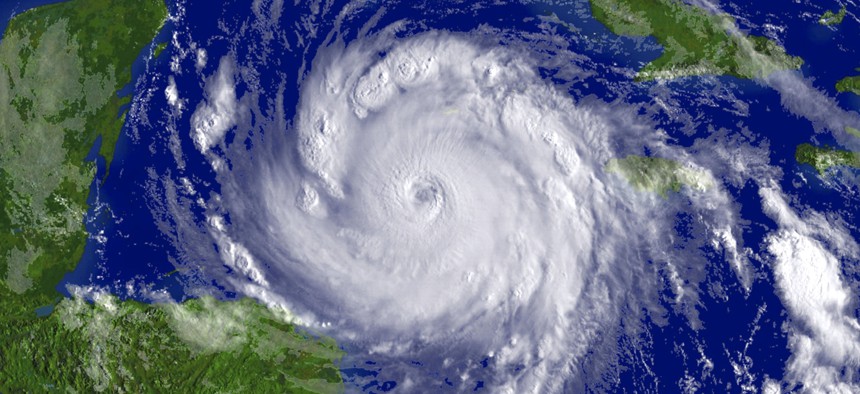Partnerships and Improved Data May Bolster U.S. Weather Predictions

Science Photo Library - NOAA/Getty
Weather experts at a Congressional hearing for the reauthorization of the Weather Act noted that collaborating to collect more data and improve its assimilation will help improve weather predictions.
Recent weather events, such as the tornadoes that swept through Mississippi and Alabama on Friday evening, highlight the importance of weather data and weather prediction. However, more data and resources are needed to improve predictions, according to weather experts.
A House Environmental Subcommittee hearing on Tuesday on reauthorizing the Weather Act examined the need for data and innovation to improve predictions, particularly given the increase in extreme weather impacting the United States. As noted in the hearing ,the U.S. experienced 18 weather and climate disasters costing at least $1 billion each in 2022 alone.
Experts spoke to how partnerships play a critical role in weather data and predictions. The government, private sector and academia each contribute to this field and working together strengthens the available data to use to help provide more accurate weather predictions.
“Today’s hearing will focus primarily on one particular piece of the puzzle: the private sector and what they bring to the table for NOAA and the Weather Service,” Subcommittee Chairman Max Miller, R-Ohio, said. “The data and innovation they offer can make immediate and impactful improvements to the status quo… It’s all very exciting stuff and truly on the cutting-edge of scientific innovation. But completing the transition from initial demonstration of these technologies to long term commercial operation requires policy that encourages federal partnerships.”
The hearing also served as the first of several meetings on the reauthorization of the Weather Act of 2017.
“While the Weather Act had an immediate positive impact, we still have work to do if we want to once again be the most accurate and trusted source of forecasting in the world,” House Science, Space and Technology Chairman Frank Lucas, R-Okla., said. “Before the Weather Act was signed into law, I was told countless times that commercial weather data wasn’t viable – that no private company could provide the quality and quantity of information NOAA needs for their operational forecasts. Flash forward to this year, NOAA is going to invest $27 million on either purchasing data or demonstrating its use in forecasts. That’s quite the success story and a testament to the innovation of American businesses.”
Meanwhile, Committee Ranking Member Zoe Lofgren, D-Calif., noted the importance of supporting NOAA, the commercial sector and academia to improve weather modeling and support NOAA’s mission.
“The commercial data sector can help contribute to NOAA’s data collection efforts in a complementary manner,” Lofgren said. “In addition, academia has to be supported in their efforts to advance fundamental understanding of the science and innovations in weather modeling.”
Richard Jenkins, founder & CEO of Saildrone, Inc. and Meredith Bell, atmospheric program manager at FLYHT Inc., described their respective companies’ capabilities, while emphasizing that the private sector can augment and supplement NOAA and other agency data to help improve predictions.
For example, Saildrone has certain vehicles that can work in water deeper than six feet and Jenkins noted it is a “long endurance” platform focusing on lakes and oceans. Jenkins noted Saildrone’s partnership with NOAA, which has “helped both advance capabilities and in turn provide valuable services and data back to NOAA.” The company is also serving as a data-as-a-service provider to the agency.
Bell stated how FLYHT partners with airline companies to add sensors to their airplanes and then send that data over to NOAA. She added that turbulence forecasting is also something that the private sector could help with.
However, witnesses noted there are gaps in weather data collection.
“There’s definitely a collaboration between NOAA and the private sector,” Bell said. “There needs to be more funding for that collaboration because, as much as we do need data assimilation, there are definitely data sparse regions out there that we need to look at. I have talked to NOAA meteorologists and they do have a desire to have more data than they currently have. And I’ve even talked to forecasters in various offices that have expressed the needs of having more real-time data.”
Jenkins noted that it is also important to consider the critical role oceans play in weather prediction and forecasting despite being “largely unobserved, unexplored and unmapped.” He noted using the company’s sail drones in the eyes of hurricanes would provide important data for NOAA and other entities. Jenkins urged Congress to consider prioritizing ocean data for NOAA to turn to the private sector.
Additionally, the witnesses stated that investment in data collection and data assimilation is critical, as is investment in computing and technology to process the troves of data needed for accurate weather prediction.
According to several speakers, NOAA and other agencies are not fully utilizing existing data because of resource limitations.
“America’s weather enterprise already has a significant amount of data at its disposal, but U.S. weather forecasting capabilities continue to lag behind our European counterparts,” said Antonio J. Busalacchi Jr, president of the University Corporation for Atmospheric Research. “This discrepancy is not due to a data deficit compared to the Europeans, rather our European colleagues have made greater advances in what is called data assimilation and their forecast models are better able to utilize the data that are already available. Therefore, it is critical that policymakers make significant investments in data assimilation, and the modeling and forecasting workforce to enable more accurate predictive forecasts in service to society with the existing observing systems we already have.”
They also emphasized the need to grow the data scientist workforce to help with these goals.
“The vast majority of our data assimilation scientists, software engineers are coming from overseas,” Busalacchi said. “We need to invest in our universities, community colleges for workforce development because if we don’t we’re going to continue to fall behind our colleagues and our adversaries.”






